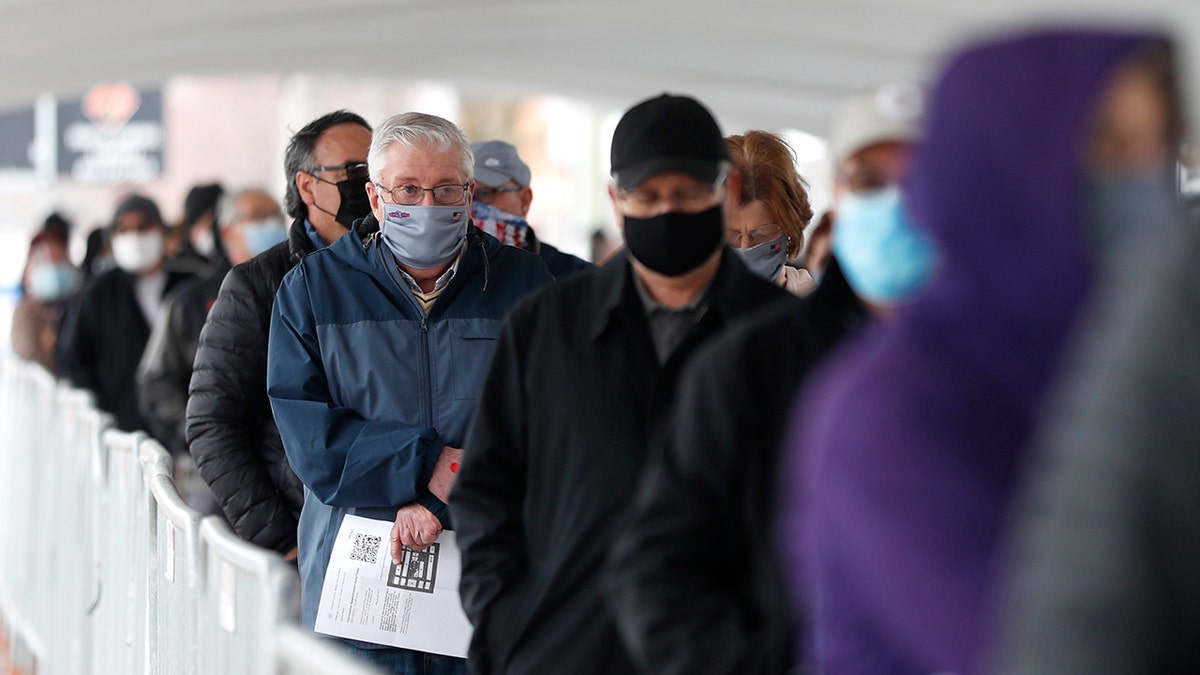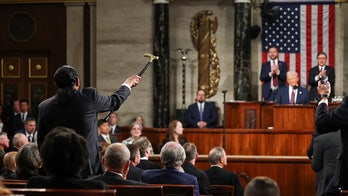Biden touts success of vaccination efforts as US nears milestone
FOX News correspondent David Lee Miller has the latest developments on 'Special Report'
About 182 million Americans have yet to receive a first dose of the COVID-19 vaccine — and despite the White House's promises to vaccinate them first, the Biden administration is already making plans to send doses to neighbors in Canada and Mexico.
White House press secretary Jen Psaki announced Friday that the U.S. plans to send 2.5 million doses of AstraZeneca's COVID-19 vaccine to Mexico, and 1.5 million doses to Canada.
The Biden administration has said that once U.S. citizens are vaccinated, the next step is ensuring Canada and Mexico are able to manage the pandemic so the borders can reopen. That could mean more vaccines for Canada faster and a shorter wait for second doses.
The loan deal will not affect President Biden's goal of having all adult Americans eligible for a vaccine by May 1 and will not reduce the supply of available vaccine in the U.S., a senior administration official told Reuters.
Although Canada's economy is tightly interconnected with the U.S., Washington hasn't allowed the hundreds of millions of vaccine doses made in America to be exported until now, and Canada has had to turn to Europe and Asia.
The AstraZeneca vaccine has not been authorized for use in the U.S. but has been by the World Health Organization. Tens of millions of doses have been stockpiled in the U.S. should it receive emergency use authorization, sparking an international outcry that lifesaving doses were being withheld when they could be used elsewhere.
But AstraZeneca, in a statement regarding their U.S. plans on Monday, said they plan to submit their EUA application to the FDA in "the first half of April."
"Should it be approved, we can deliver 30 million doses immediately upon EUA, and additional doses to total up to 50M in the weeks to follow," they said. "Thereafter, we plan to provide 15-20M doses per month."
According to the White House, the U.S. has a stockpile of 7 million releasable doses of AstraZeneca doses. That includes the amount the administration would be loaning to Mexico and Canada.

People wait in line at the check-in area to enter the United Center mass COVID-19 vaccination site Wednesday, March 10, 2021, in Chicago. (AP Photo/Shafkat Anowar)
Meanwhile, the vaccine supply chain difficulties have forced Canada to extend the time between the first shot and the second by up to four months so that everyone can be protected faster with the primary dose. The hope is to get all adults at least one shot by the end of June.
BIDEN FOCUSED ON COVID19 VACCINES FOR 'EVERY AMERICAN' BEFORE AIDING OTHER NATIONS, PSAKI SAYS
Canadian regulators have approved the Pfizer, Moderna, AstraZeneca and Johnson & Johnson vaccines, but acquiring them has proven difficult.
Canada ranks about 20th in the number of doses administered, with about 8% of the adult population getting at least one shot. That compares with about 38% in the U.K. and 22% in the U.S.
The vaccine-sharing plan is not fully finalized, Psaki said, adding the "loan" could include other doses, but did not provide further details, while noting Americans getting vaccinated remains the administration’s "first priority."
"Our first priority remains vaccinating the U.S. population," Psaki said at the daily briefing, though added that "ensuring our neighbors can contain the virus is a mission-critical step, is mission critical to ending the pandemic."
Earlier this month, Mexican President Manuel López Obrador reportedly asked President Biden for vaccine aid, but when asked by reporters whether the president would support that proposal, Psaki gave an emphatic "no."
"No," she said. "The president has made clear that he is focused on ensuring vaccines are accessible to every American. That is our focus."
She added: "But our focus, his focus, the administration’s focus, is making sure every American is vaccinated, and when we accomplish that objective, we're happy to discuss further steps beyond that."
So far, according to the Centers for Disease Control and Prevention, 81.4 million Americans have received at least one dose of a COVID-19 vaccine, while 44.1 million Americans have been fully vaccinated.
But the president set a goal of vaccinating at least 100 million Americans within his first 100 days — a goal administration officials say is realistic, and one that they will have surpassed, as the U.S. vaccinates more Americans per day than officials initially believed they could.
CLICK HERE TO GET THE FOX NEWS APP
Meanwhile, as for other foreign aid, the Biden administration announced before the virtual G-7 meeting last month that they committed $2 billion for the global COVAX vaccine initiative using funds already allocated by Congress, plus an additional $2 billion over the next two years.
COVAX is an alliance backed by the United Nations, which aims to deliver vaccines to the world's most vulnerable nations.
Also, as as part of the virtual G-7 meeting last month, the president discussed a global response to the coronavirus pandemic, including coordination on vaccine production, distribution and supplies.
Former President Trump in December signed an executive order that ensured all Americans have access to the coronavirus vaccine before the U.S. government begins aiding nations around the world.
Trump administration officials, at the time, said the order was meant to reemphasize to the American people that the "the priority has been an America First approach."
Fox News' Kaitlin Sprague, Madeline Farber, Remy Numa and The Associated Press contributed to this report.















































